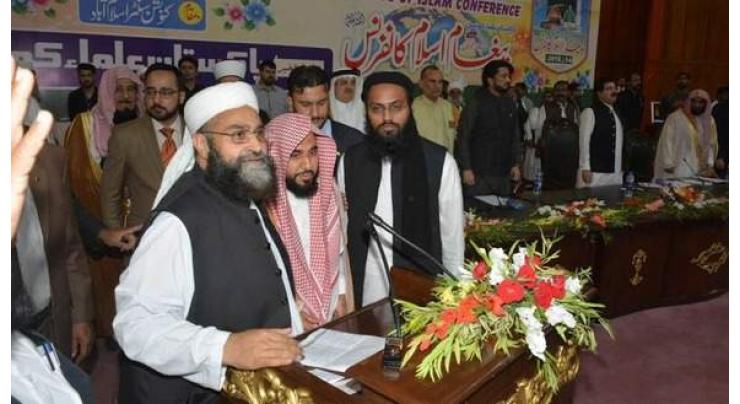
- Home
- Pakistan
- News
- Ulema, Mashaykh call for political accountability, collaboration for Pakistan's stability
Ulema, Mashaykh Call For Political Accountability, Collaboration For Pakistan's Stability
Fahad Shabbir (@FahadShabbir) Published May 10, 2024 | 11:27 PM

In response to the Pakistan Ulema Council (PUC)'s appeal, ‘Pakistan Stability Day’ was observed nationwide on Friday
ISLAMABAD, (UrduPoint / Pakistan Point News - 10th May, 2024) In response to the Pakistan Ulema Council (PUC)'s appeal, ‘Pakistan Stability Day’ was observed nationwide on Friday.
Addressing congregations during Friday prayers from Karachi to Khyber, religious scholars and leaders reflected on May 9th as a dark chapter in Pakistan's history, marked by the destruction of crucial defense installations and monuments by nefarious elements.
They emphasized that by dishonoring the martyrs, the enemy's agenda was furthered. The perpetrators of these heinous acts should be brought to justice, and innocent individuals must be acquitted, they added.
To steer Pakistan towards stability, they said a cessation of confrontational politics was imperative. They were of the opinion that all political entities should openly acknowledge their errors and embrace dialogue. “This nation belongs to all of us, and it is incumbent upon each of us to resolve its issues and guide it towards stability and progress,” they added.
These views were expressed by Pakistan Ulema Council Chairman Hafiz Muhammad Tahir Mehmood Ashrafi, Allama Abdul Haq Mujahid, Maulana Muhammad Rafiq Jami, Maulana Nauman Hashir, Maulana Asad Zakaria Qasmi, Maulana Muhammad Shafi Qasmi, Maulana Asadullah Farooq, Allama Zubair Abid, Maulana Muhammad Ashfaq Pittafi, Maulana Abu Bakr Hameed Sabri, Maulana Tahir Aqeel Awan, Maulana Aziz Akbar Qasmi, Maulana Haq Nawaz Khalid, Maulana Obaidullah Gormani, Allama Tahir-ul-Hasan Maulana Hanif Usmani, Maulana Muhammad Asghar Khosa, Maulana Anwar-ul-Haq Mujahid, Maulana Abdul Malik Asif, Maulana Aslam Siddiqui, Maulana Abdul Hakeem Athar, Maulana Abdullah Haqqani, Maulana Abdul Waheed Farooqui, Maulana Abu Bakr Hamza, Maulana Habib-ur-Rehman Abid, Maulana Amin-ul-Haque Ashrafi, Maulana Izhar-ul-Haq Khalid, Sahibzada Hamza Tahir-ul-Hassan, Maulana Saadullah Ludhianwi, Maulana Anis-ur-Rehman Baloch, Maulana Abdul Rasheed, Mufti Muhammad Umar Farooq, Maulana Abdul Ghaffar Shah Hijazi, Maulana Muhammad Ahmad Makki, Maulana Aziz-ur-Rehman Muawiya, Mufti Imran Muawiya, Maulana Saadullah Shafiq, Maulana Yasir Alvi, Qari Abdul Rauf, Maulana Matloob Mahar, Maulana Zubair Khatana, Maulana Aqeel Zubairi, Qari Aziz-ur-Rehman, Maulana Shabbir Khatana, Maulana Zubair Khatana, Qari Abdul Majid Lahori, Maulana Farooq Khanpuri, Maulana Qasim Sangi, Maulana Ashraf Malik, Maulana Ijaz Malik, Qari Abdul Wahab Muawiya, Maulana Muhammad Bilal Saqib, Qari Ibrahim, Qari Riaz, Maulana Ameer Muawiya, Mahar Abdul Khaliq Murali, Maulana Muneeb-ur-Rehman Haidari, Qari Mohabat Ali Qasmi, Qari Zulqarnain, Maulana Tayyab Qureshi, Qari Mehmood-ul-Hassan, Qari Abdul Majid Malik, and Maulana Waqas Iqbal during Friday sermons.
The learned scholars and spiritual leaders emphasized that those responsible for the events of May 9, against whom evidence exists, must undergo swift judicial proceedings. They said prolonged delays in these crucial cases were worrisome for the nation, as they allow malevolent forces to exploit the situation, sow discord among the populace, and destabilize the country.
They said the unified forces and citizens would continue to stand together to navigate the nation out of its current challenges towards a path of stability and progress.
They emphasized that all political factions should set aside their personal agendas, collaborate for Pakistan's stability, openly acknowledge their errors, and humbly apologize for them. “Admitting and apologizing for mistakes is a hallmark of great leadership,” they opined.
In the wake of enduring crises, Ulema and Mashaykh said Pakistan was once again progressing towards economic stability. In this context, they said all political entities must exhibit responsible conduct and contribute to the nation's journey towards stability.
They said the nation could not afford further discord. With established courts and institutions, they said individuals with grievances should seek recourse through proper channels instead of resorting to street protests that hinder developmental progress. They said such actions were in the best interest of the country and its citizens.
Recent Stories

PTI founder acquitted in May 9 vandalism case

Liverpool confirm Slot will replace Klopp as manager

Russian playwright & director on trial for 'justifying' terrorism

Free media, responsible opposition play crucial roles in national development: S ..

AJK leaders condolence Iranian President's demise in helicopter crash

Schauffele birdies final hole to capture PGA for first major win

Police arrest two persons in murder case

ICC seeks arrest warrants for Israeli PM, defence minister and Hamas leaders

Business community condole tragic death of Iranian President

Murad Baloch calls on Governor Balochistan

City faces heatwave, temperature soars to 43.7°C

Bhai Khan Welfare association setup heat stroke centre
More Stories From Pakistan
-
Punjab Assembly passes 'Punjab Defamation Bill 2024'
22 minutes ago -

PTI founder acquitted in May 9 vandalism case
40 minutes ago -

Free media, responsible opposition play crucial roles in national development: Salim
50 minutes ago -

Police arrest two persons in murder case
53 minutes ago -

Business community condole tragic death of Iranian President
53 minutes ago -

Murad Baloch calls on Governor Balochistan
53 minutes ago
-

Bhai Khan Welfare association setup heat stroke centre
50 minutes ago -

Pak, Kyrgyz ministers meet to address recent issue against students
50 minutes ago -

NEPRA approves K-Electric’s power acquisition program for FY 2024-2028
59 minutes ago -

CTFK calls for not giving permission for 10 sticks cigarette packs
50 minutes ago -

WASA disconnects 397 connections over default
50 minutes ago -

DPM Dar urges Kyrgyz FM to punish perpetrators involved in attacks on Pakistani students
50 minutes ago










